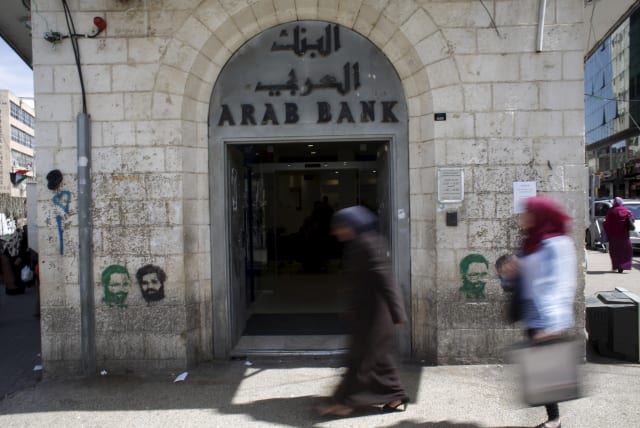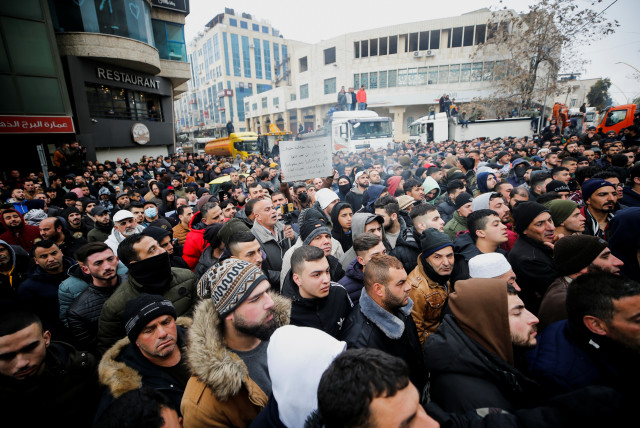Funding crisis endangers Palestinian statehood, UN warns donor parley

In the absence of a peace process, the AHLC has become one of the few forums in which Israeli and Palestinian officials cooperatively meet.
Palestinian statehood is in danger due to a financial crisis caused in part by a steep drop in foreign funding and Israel’s withholding of tax fees, the United Nations warned in advance of a donor parley in Brussels on Wednesday and Thursday.
There could be a “serious reversal in the Palestinian state-building project” and a “furthering institutional erosion of the PA and deepening insecurity,” UN Special Coordinator for the Middle East Peace Process Tor Wennesland said on Tuesday.
“Needs are expected to increase exponentially in the medium term,” Wennesland said as his office, known as UNSCO, issued a report explaining that the PA may soon be unable to provide basic social services.
He spoke out in advance of the biannual meeting of 15 member Ad Hoc Liaison Committee (AHLC) in Brussels which is chaired by Norway and includes representatives from the PA, Israel, the United States, the European Union and the UN.
Other participants include the World Bank and the International Monetary Fund, Russia, Japan, Saudi Arabia, Canada, Jordan, Egypt, and Tunisia.
PA Prime Minister Mohammed Shtayyeh is expected to lead the Palestinian delegation to Brussels, while Israel will be represented by the Foreign Ministry’s Deputy Director General Oded Yosef.
The group assesses the Palestinian economy and discusses ways to best assist it and direct existing funding toward essential projects.
In the absence of a peace process, it has become one of the few forums in which Israeli and Palestinian officials cooperatively meet.
“Further PA reforms, while still necessary, are unlikely to be sufficient to address the crisis and put the PA on more sustainable fiscal footing”, UNSCO warned.
UNSCO painted a bleak picture of the Palestinian economy, explaining that it was beset by so many forces beyond its control that even if it successfully executed all reforms possible, it could still not escape its funding crisis.
It highlights the steep drop in donor funding to the PA of over 80% from 2013 - when it stood at $1.4 billion - compared to just $350 million last year. UNSCO projected that the PA would receive only $300 million in donor funds this year as foreign financing continued to decline.
Israel’s decision to double the funds it withholds from the tax fees it collects on behalf of the PA to $30 million per month has only “exacerbated” the situation, UNSCO said. Israel does so to offset the monthly payment the PA makes to Palestinian terrorists and their family members.
“Resolving the issue could unlock an estimated 800 million USD ormolu in total withheld revenues b year-end 2023,” the UN said.
Then there is the issue of Israel's restrictions on goods that enter and exit the Gaza Strip through the Kerem Shalom crossing, which has over time pushed Palestinians to seek an alternative route through the Rafah crossing into Egypt.
“More than one-third of total comical traffic into the Strip” now goes through the Rafah Crossing where the PA does not generate any revenue, UNSCO explained.
Israeli elimination of restrictions on Palestinian access to farmland in Area C of the West Bank would improve PA revenues by some six to nine percent of the GDP, UNSCO said.
The World Bank issued a report which spoke of the PA’s fiscal crisis, but took a less pessimistic approach as it spoke of the PA’s recovery from the impact of the COVID-19 pandemic, but still spoke of a bleak outlook, particularly in light of Israeli-Palestinian violence and the absence of peace process.
“Despite signs of recovery in 2022, growth remains sensitive to the escalation of tensions in the Palestinian territories and the ongoing restrictions on mobility, access and trade,” said Stefan Emblad, World Bank Country Director for West Bank and Gaza.
The World Bank said that the PA’s financing gap had “fared better than initial forecasts, closing the year at US $351 million, or the equivalent of 1.8% of the GDP, down from 5.7% in 2021.”
Jerusalem Post Store
`; document.getElementById("linkPremium").innerHTML = cont; var divWithLink = document.getElementById("premium-link"); if (divWithLink !== null && divWithLink !== 'undefined') { divWithLink.style.border = "solid 1px #cb0f3e"; divWithLink.style.textAlign = "center"; divWithLink.style.marginBottom = "15px"; divWithLink.style.marginTop = "15px"; divWithLink.style.width = "100%"; divWithLink.style.backgroundColor = "#122952"; divWithLink.style.color = "#ffffff"; divWithLink.style.lineHeight = "1.5"; } } (function (v, i) { });


